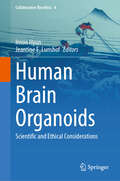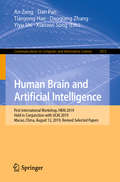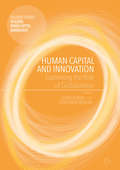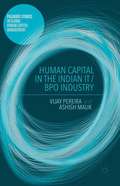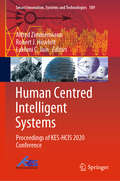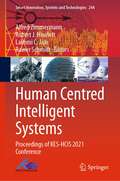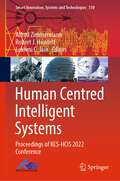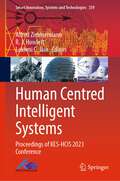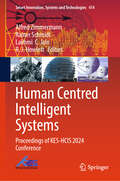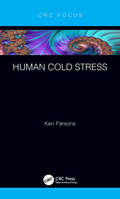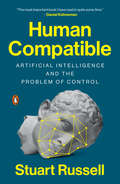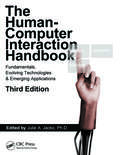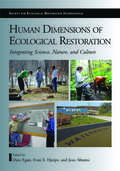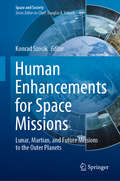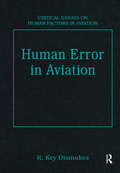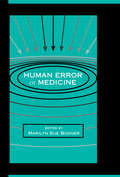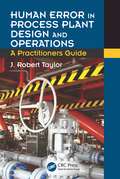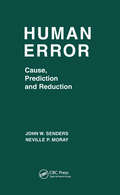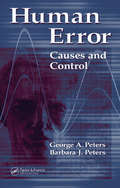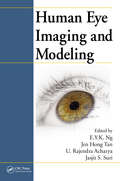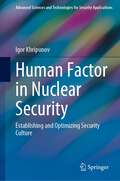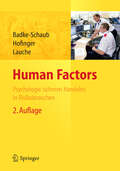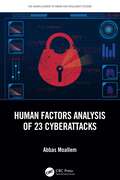- Table View
- List View
Human Brain Organoids: Scientific and Ethical Considerations (Collaborative Bioethics #4)
by Insoo Hyun Jeantine E. LunshofBrain organoids are small stem cell-derived, self-organizing models of specific brain regions that offer researchers new ways to study the human brain. Since their scientific debut over ten years ago, brain organoids have been used to generate tractable new bioengineered tools for understanding functional interconnectivity of the human brain, dysfunction involved in many neurodegenerative diseases, and certain molecular mechanisms underlying cognition. Despite this field’s considerable scientific promise, advances in human brain organoid research also raise novel philosophical questions and ethical concerns around the use of complex human brain models and the ethical boundaries that should exist when manipulating increasingly realistic bioengineered brain constructs. As researchers generate more realistic organoids in vitro that resemble human brains, it is critically important to understand what ethical boundaries may exist and where researchers and regulators should draw the line for research, both to reduce uncertainties over which projects to pursue in the lab and to address future concerns regulators and the public may harbor about whether this research, if left unexamined, could inadvertently undermine public trust in science. This proposed book delves into ongoing and proactive ethical discussions among ethicists and the neuroscientists involved with this cutting-edge work. Its ultimate goal is to foster greater awareness, understanding, and guidance for future management of ethical issues that may be unique to new areas of brain organoid research. This volume is the result of a close partnership between ethicists and scientists, each informing the other through a collaborative process of joint bioethical deliberation.
Human Brain and Artificial Intelligence: First International Workshop, HBAI 2019, Held in Conjunction with IJCAI 2019, Macao, China, August 12, 2019, Revised Selected Papers (Communications in Computer and Information Science #1072)
by Daoqiang Zhang Tianyong Hao An Zeng Dan Pan Yiyu Shi Xiaowei SongThis book constitutes the refereed proceedings of the workshop held in conjunction with the 28th International Conference on Artificial Intelligence, IJCAI 2019, held in Macao, China, in August 2019: the First International Workshop on Human Brain and Artificial Intelligence, HBAI 2019. The 24 full papers presented were carefully reviewed and selected from 62 submissions. The papers are organized according to the following topical headings: computational brain science and its applications; brain-inspired artificial intelligence and its applications.
Human Capital and Innovation
by Sumit Kundu Surender MunjalThe second title in the Palgrave Studies in Global Human Capital Management series, this book explores how human capital contributes to innovation within the context of an inter-connected and globalized world. Investigating globalization as a phenomenon reflected within increasing cross-border flows of goods, services, know-how and talent, Human Capital and Innovation: Examining the Role of Globalization illustrates various facets of innovation at individual, team and organizational level. It highlights the influence of new economic realities, such as technological advances and the rise of emerging economies, on human capital and innovation.
Human Capital in the Indian IT/BPO Industry
by Vijay Pereira Ashish MalikHuman Capital in the Indian IT / BPO Industry analyses human capital management in the Indian information technology (IT) and business process outsourcing (BPO) industry, which has created a new paradigm for organising global talent engaged in designing and delivering IT and BPO services. The authors explore the evolution of the innovative talent management strategies of knowledge workers, which has received little attention in existing literature analysis. This book provides a rich theoretical grounding of managing human resources in the context of high-technology professional services firms, focusing on the design and implementation of high performance work system designs in the context of Indian IT/BPO organizations.
Human Centred Intelligent Systems: Proceedings of KES-HCIS 2020 Conference (Smart Innovation, Systems and Technologies #189)
by Lakhmi C. Jain Robert J. Howlett Alfred ZimmermannThis book highlights new trends and challenges in intelligent systems, which play an important part in the digital transformation of many areas of science and practice. It includes papers offering a deeper understanding of the human-centred perspective on artificial intelligence, of intelligent value co-creation, ethics, value-oriented digital models, transparency, and intelligent digital architectures and engineering to support digital services and intelligent systems, the transformation of structures in digital businesses and intelligent systems based on human practices, as well as the study of interaction and the co-adaptation of humans and systems. All papers were originally presented at the International KES Conference on Human Centred Intelligent Systems 2020 (KES HCIS 2020), held on June 17–19, 2020, in Split, Croatia.
Human Centred Intelligent Systems: Proceedings of KES-HCIS 2021 Conference (Smart Innovation, Systems and Technologies #244)
by Lakhmi C. Jain Robert J. Howlett Rainer Schmidt Alfred ZimmermannThis book highlights new trends and challenges in intelligent systems, which play an essential part in the digital transformation of many areas of science and practice. It includes papers offering a deeper understanding of the human-centred perspective on artificial intelligence, of intelligent value co-creation, ethics, value-oriented digital models, transparency, and intelligent digital architectures and engineering to support digital services and intelligent systems, the transformation of structures in digital business and intelligent systems based on human practices, as well as the study of interaction and co-adaptation of humans and systems. All papers were originally presented at the International KES Conference on Human Centred Intelligent Systems 2021 (KES HCIS 2021) held on June 14–16, 2021 in the KES Virtual Conference Centre.
Human Centred Intelligent Systems: Proceedings of KES-HCIS 2022 Conference (Smart Innovation, Systems and Technologies #310)
by Lakhmi C. Jain Robert J. Howlett Alfred ZimmermannThe volume includes papers presented at the International KES Conference on Human Centred Intelligent Systems 2022 (KES HCIS 2022), held in Rhodes, Greece on June 20–22, 2022. This book highlights new trends and challenges in intelligent systems, which play an important part in the digital transformation of many areas of science and practice. It includes papers offering a deeper understanding of the human-centred perspective on artificial intelligence, of intelligent value co-creation, ethics, value-oriented digital models, transparency, and intelligent digital architectures and engineering to support digital services and intelligent systems, the transformation of structures in digital businesses and intelligent systems based on human practices, as well as the study of interaction and the co-adaptation of humans and systems.
Human Centred Intelligent Systems: Proceedings of KES-HCIS 2023 Conference (Smart Innovation, Systems and Technologies #359)
by Lakhmi C. Jain Alfred Zimmermann R. J. HowlettThe volume includes papers presented at the International KES Conference on Human Centred Intelligent Systems 2023 (KES HCIS 2023), held in Rome, Italy on June 14–16, 2023. This book highlights new trends and challenges in intelligent systems, which play an important part in the digital transformation of many areas of science and practice. It includes papers offering a deeper understanding of the human-centred perspective on artificial intelligence, of intelligent value co-creation, ethics, value-oriented digital models, transparency, and intelligent digital architectures and engineering to support digital services and intelligent systems, the transformation of structures in digital businesses and intelligent systems based on human practices, as well as the study of interaction and the co-adaptation of humans and systems.
Human Centred Intelligent Systems: Proceedings of KES-HCIS 2024 Conference (Smart Innovation, Systems and Technologies #414)
by Lakhmi C. Jain Rainer Schmidt Alfred Zimmermann R. J. HowlettThe volume includes papers presented at the International KES Conference on Human Centred Intelligent Systems 2024 (KES HCIS 2024), held in Madeira, Portugal on June 19–21, 2024. This book highlights new trends and challenges in intelligent systems, which play an important part in the digital transformation of many areas of science and practice. It includes papers offering a deeper understanding of the human-centred perspective on artificial intelligence, of intelligent value co-creation, ethics, value-oriented digital models, transparency, and intelligent digital architectures and engineering to support digital services and intelligent systems, the transformation of structures in digital businesses and intelligent systems based on human practices, as well as the study of interaction and the co-adaptation of humans and systems.
Human Cold Stress
by Ken ParsonsThis book provides an up-to-date, accessible, and comprehensive coverage of human cold stress from principles and theory to practical application. It defines cold stress and how people respond to it. It describes how to assess a cold environment to predict when discomfort, wind-chill, hypothermia, shivering, frostbite, and other consequences will occur. It also advises on what to do to prevent unacceptable outcomes, including determination and selection of clothing to preserve comfort and health. The book will be of interest to practitioners and students and anyone involved with fields such as textiles, clothing, and industrial hygiene.
Human Compatible: Artificial Intelligence and the Problem of Control
by Stuart Russell"The most important book I have read in quite some time" (Daniel Kahneman); "A must-read" (Max Tegmark); "The book we've all been waiting for" (Sam Harris)A leading artificial intelligence researcher lays out a new approach to AI that will enable us to coexist successfully with increasingly intelligent machinesLonglisted for the 2019 Financial Times/McKinsey Business Book of the Year AwardIn the popular imagination, superhuman artificial intelligence is an approaching tidal wave that threatens not just jobs and human relationships, but civilization itself. Conflict between humans and machines is seen as inevitable and its outcome all too predictable. In this groundbreaking book, distinguished AI researcher Stuart Russell argues that this scenario can be avoided, but only if we rethink AI from the ground up. Russell begins by exploring the idea of intelligence in humans and in machines. He describes the near-term benefits we can expect, from intelligent personal assistants to vastly accelerated scientific research, and outlines the AI breakthroughs that still have to happen before we reach superhuman AI. He also spells out the ways humans are already finding to misuse AI, from lethal autonomous weapons to viral sabotage. If the predicted breakthroughs occur and superhuman AI emerges, we will have created entities far more powerful than ourselves. How can we ensure they never, ever, have power over us? Russell suggests that we can rebuild AI on a new foundation, according to which machines are designed to be inherently uncertain about the human preferences they are required to satisfy. Such machines would be humble, altruistic, and committed to pursue our objectives, not theirs. This new foundation would allow us to create machines that are provably deferential and provably beneficial.In a 2014 editorial co-authored with Stephen Hawking, Russell wrote, "Success in creating AI would be the biggest event in human history. Unfortunately, it might also be the last." Solving the problem of control over AI is not just possible; it is the key that unlocks a future of unlimited promise.
Human Computer Interaction Handbook: Fundamentals, Evolving Technologies, and Emerging Applications, Third Edition (Human Factors and Ergonomics)
by Julie A. JackoWinner of a 2013 CHOICE Outstanding Academic Title Award The third edition of a groundbreaking reference, The Human-Computer Interaction Handbook: Fundamentals, Evolving Technologies, and Emerging Applications raises the bar for handbooks in this field. It is the largest, most complete compilation of HCI theories, principles, advances, case st
Human Dimensions of Ecological Restoration: Integrating Science, Nature, and Culture (Science Practice Ecological Restoration)
by Jesse Abrams Evan E. Hjerpe Dave EganHuman Dimensions of Ecological Restoration takes an interdisciplinary look at the myriad human aspects of ecological restoration. In twenty-six chapters written by experts from around the world, it provides practical and theoretical information, analysis, models, and guidelines for optimizing human involvement in ecological restoration projects. The book delves into the often-neglected aspects of ecological restoration that ultimately make the difference between projects that are successfully executed and maintaned with the support of informed, engaged citizens, and those that are unable to advance past the conceptual stage due to misunderstandings or apathy. The lessons contained will be valuable to restoration veterans and greenhorns alike, scholars and students in a range of fields, and individuals who care about restoring their local lands and waters.
Human Dimensions of Wildlife Management in Japan: From Asia to the World (Ecological Research Monographs)
by Ryo SakuraiThis book discusses the findings of research on the human dimensions of wildlife management conducted in Japan, demonstrating how such research and approaches have contributed to mitigating human-wildlife conflicts.Human-wildlife conflicts, including agricultural and property damage as well as occasional casualties, are a global problem for which local residents, managers, and stakeholders around the world are struggling to find solutions. Human dimensions of wildlife management (HDW) is an academic field developed in North America in the 1970s to gather information on the social aspects of human-wildlife issues to help wildlife managers and stakeholders implement effective decision-making measures. However, HDW is not widely recognized or applied outside North America, and few studies have investigated whether HDW approaches would be effective in different cultural settings.This is the first book written in English to introduce the HDW theories and practices implemented in Asia. Presenting innovative approaches and research techniques, as well as tips on how to introduce HDW methods into culturally different societies, it is a valuable resource not only for researchers and students in this field, but also for government officials/managers, NGOs, residents and other stakeholders who are affected by human-wildlife conflicts around the globe.
Human Enhancements for Space Missions: Lunar, Martian, and Future Missions to the Outer Planets (Space and Society)
by Konrad SzocikThis book presents a collection of chapters, which address various contexts and challenges of the idea of human enhancement for the purposes of human space missions. The authors discuss pros and cons of mostly biological enhancement of human astronauts operating in hostile space environments, but also ethical and theological aspects are addressed. In contrast to the idea and program of human enhancement on Earth, human enhancement in space is considered a serious and necessary option. This book aims at scholars in the following fields: ethics and philosophy, space policy, public policy, as well as biologists and psychologists.
Human Error in Aviation (Critical Essays On Human Factors In Aviation Ser.)
by R. Key DismukesMost aviation accidents are attributed to human error, pilot error especially. Human error also greatly effects productivity and profitability. In his overview of this collection of papers, the editor points out that these facts are often misinterpreted as evidence of deficiency on the part of operators involved in accidents. Human factors research reveals a more accurate and useful perspective: The errors made by skilled human operators - such as pilots, controllers, and mechanics - are not root causes but symptoms of the way industry operates. The papers selected for this volume have strongly influenced modern thinking about why skilled experts make errors and how to make aviation error resilient.
Human Error in Medicine (Human Error and Safety)
by Marilyn Sue BognerThis edited collection of articles addresses aspects of medical care in which human error is associated with unanticipated adverse outcomes. For the purposes of this book, human error encompasses mismanagement of medical care due to: * inadequacies or ambiguity in the design of a medical device or institutional setting for the delivery of medical care; * inappropriate responses to antagonistic environmental conditions such as crowding and excessive clutter in institutional settings, extremes in weather, or lack of power and water in a home or field setting; * cognitive errors of omission and commission precipitated by inadequate information and/or situational factors -- stress, fatigue, excessive cognitive workload. The first to address the subject of human error in medicine, this book considers the topic from a problem oriented, systems perspective; that is, human error is considered not as the source of the problem, but as a flag indicating that a problem exists. The focus is on the identification of the factors within the system in which an error occurs that contribute to the problem of human error. As those factors are identified, efforts to alleviate them can be instituted and reduce the likelihood of error in medical care. Human error occurs in all aspects of human activity and can have particularly grave consequences when it occurs in medicine. Nearly everyone at some point in life will be the recipient of medical care and has the possibility of experiencing the consequences of medical error. The consideration of human error in medicine is important because of the number of people that are affected, the problems incurred by such error, and the societal impact of such problems. The cost of those consequences to the individuals involved in medical error, both in the health care providers' concern and the patients' emotional and physical pain, the cost of care to alleviate the consequences of the error, and the cost to society in dollars and in lost personal contributions, mandates consideration of ways to reduce the likelihood of human error in medicine. The chapters were written by leaders in a variety of fields, including psychology, medicine, engineering, cognitive science, human factors, gerontology, and nursing. Their experience was gained through actual hands-on provision of medical care and/or research into factors contributing to error in such care. Because of the experience of the chapter authors, their systematic consideration of the issues in this book affords the reader an insightful, applied approach to human error in medicine -- an approach fortified by academic discipline.
Human Error in Process Plant Design and Operations: A Practitioner's Guide
by J. Robert TaylorIn contrast to nuclear plants and aerospace systems, human error is largely ignored in quantitative risk assessment for petroleum and chemical plants. Because of this, current risk analysis methods are able to calculate and predict only about one-third of the accidents happening in practice. Human Error in Process Plant Design and Operations: A Pra
Human Error: Cause, Prediction, and Reduction (Applied Psychology Ser.)
by John W. Senders Neville P. MorayThis volume examines the nature of human error -- its causes and origins, its classifications, and the extent to which it is possible to predict and prevent errors and their impact. One of the first texts to deal with this topic in detail, it draws into a single cohesive account contributions from experts in a range of disciplines including psychology, philosophy, and engineering. Offering an insightful discussion of fundamental and necessary questions about the nature and source of human error, the book draws significant conclusions and identifies areas worthy of further exploration. This volume will be of interest to all who are concerned with the impact human error has on both the individual and society.
Human Error: Causes and Control
by George A. Peters Barbara J. PetersHuman error is regularly viewed as an inevitable part of everyday life. In many cases the results of human error are harmless and correctable, but in cases where injury and death can occur, reduction of error is imperative. An integration of useful how-to-do-it information, Human Error: Causes and Control covers theories, methods, and specif
Human Exposure to Pollutants via Dermal Absorption and Inhalation
by Ian Colbeck Mihalis LazaridisThe human body is exposed to pollution on a daily basis via dermal exposure and inhalation. This book reviews the information necessary to address the steps in exposure assessment relevant to air pollution. The aim is to identify available information including data sources and models, and show that an integrated multi-route exposure model can be built, validated and used as part of an air quality management process. Many epidemiological studies have focused on inhalation exposure. Whilst this is appropriate for many substances, failure to consider the importance of exposure and uptake of material deposited on the skin may lead to an over/underestimation of the risk. Hence dermal exposure is also considered. Drinking water contamination by disinfection by-products is also discussed. Written by leading experts in the field, this book provides a comprehensive review of ambient particulate matter and will be of interest to students, researchers and policymakers involved in air quality management, environmental health and related disciplines, as well as environmental consultants and ventilation engineers.
Human Eye Imaging and Modeling
by Jasjit S. Suri U. Rajendra Acharya E.Y.K. Ng Jen Hong TanAdvanced image processing and mathematical modeling techniques are increasingly being used for the early diagnosis of eye diseases. A comprehensive review of the field, Human Eye Imaging and Modeling details the latest advances and analytical techniques in ocular imaging and modeling. The first part of the book looks at imaging of the fundus as wel
Human Factor in Nuclear Security: Establishing and Optimizing Security Culture (Advanced Sciences and Technologies for Security Applications)
by Igor KhripunovThis book attempts to look into the genesis of security culture as a concept which emerged with the recognition of the role of the human factor in the context of security. It traces the rapid evolution of security culture into a multi-functional discipline reinforced by supplementary tools such as assessment and enhancement methodologies, reviews practical steps to harmonize nuclear safety and security culture as well as recommends its practical application to address insider threats and their consequences. In addition, it demonstrates how to tailor the generic model of nuclear security culture to meet specific needs of diverse facilities and activities in different countries. Finally, the book discusses several challenges which need to be addressed to make security culture a user-friendly, universal, and sustainable instrument to turn the perception of the human factor as a liability into an asset of nuclear security.
Human Factors
by Gesine Hofinger Kristina Lauche Petra Badke-SchaubIn Branchen wie Luftfahrt, Kernkraft oder Medizin können menschliche Fehler dramatische Konsequenzen haben. Deshalb werden in Risikobranchen Maßnahmen benötigt, die Fehlerquellen minimieren, sicheres Handeln fördern und dabei den "Faktor Mensch" berücksichtigen. Die Psychologie sicheren Handelns wird im 1. Teil des Standardwerks von Wissenschaftlern erläutert, im 2. Teil stellen erfahrene Praktiker und Wissenschaftler aktuelle Herausforderungen einzelner Branchen vor und präsentieren Lösungsansätze. Mit vielen Fallbeispielen und Praxishinweisen.
Human Factors Analysis of 23 Cyberattacks (The Human Element in Smart and Intelligent Systems)
by Abbas MoallemAs cyber threat actors have become more sophisticated, data breaches, phishing attacks, and ransomware are increasing, and the global cybercrime damage in 2021 was $16.4 billion a day. While technical issue analyses are fundamental in understanding how to improve system security, analyzing the roles of human agents is crucial. Human Factors Analysis of 23 Cyberattacks addresses, through examples, the human factors behind cybersecurity attacks.Focusing on human factors in individual attack cases, this book aims to understand the primary behaviors that might result in the success of attacks. Each chapter looks at a series of cases describing the nature of the attack through the reports and reviews of the experts, followed by the role and human factors analysis. It investigates where a human agent's intervention was a factor in starting, discovering, monitoring, or suffering from the attacks. Written in an easy-to-understand way and free from technical jargon, the reader will develop a thorough understanding of why cyberattacks occur and how they can be mitigated by comparison to the practical examples provided.This title will appeal to students and practitioners in the fields of ergonomics, human factors, cybersecurity, computer engineering, industrial engineering, and computer science.
